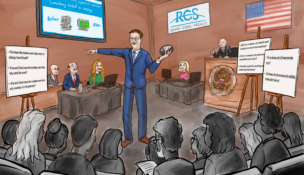Metso Minerals Industries, Inc. v. FLSmidth-Excel LLC, et al.
By: dmc-admin//August 9, 2010//
Profits lost from sales made by defendants
TRADE SECRET THEFT, PATENT INFRINGEMENT AND COMPUTER HACKING:
$25 million settlement
Case name: Metso Minerals Industries, Inc. v. FLSmidth-Excel LLC, et al.
Case number: 07-CV-00926
Court: U.S. District Court, Eastern District of Wisconsin
Judge: Hon. J.P. Stadtmueller
Settlement amount: $25 million paid in settlement by the defendants
Date of incident: 2004
Original filing date: Oct. 17, 2007
Date of disposition: The case was dismissed pursuant to agreement of the parties, as part of the settlement, on June 10, 2010.
Injuries claimed: Profits lost from sales of mining crushers sold by the defendants in competition with Metso’s crushers.
Plaintiff’s attorneys: David R. Cross, Raymond D. Jamieson, Johanna M. Wilbert, Patrick J. Murphy, Quarles & Brady LLP, Milwaukee
Defendant’s attorneys: John V. Picone, III, Hopkins & Carley, San Jose, CA; David G. Hanson, Reinhart Boerner Van Deuren S.C., Milwaukee
Expert witnesses: There were about two dozen expert witnesses named in total by the parties, including patent validity experts, damage experts, computer forensic experts, Chilean law experts, U.S. patent law experts, and experts on the reasonableness of the measures Metso took to protect its trade secrets.
Noteworthy evidentiary issues: One of the individual defendants asserted the Fifth Amendment right against self-incrimination at the defendant’s deposition. This presented interesting evidentiary issues concerning the admissibility at trial of the deposition testimony and the inferences that could be drawn from the defendant’s assertion of the Fifth Amendment, both for the claims against the individual defendant and that defendant’s employer.
Summary of the facts: Metso Minerals Industries, Inc. makes and sells high performance conical rock crushers that are used in the mining and construction industries. defendant FLSmidth-Excel (“Excel”) also makes and sells high performance conical rock crushers that are used in the mining and construction industries. Defendant Excel Foundry & Machine, Inc. (“Foundry”) makes spare parts for many different types of equipment, including the crushers that were at issue in this case. Defendants Doug Parsons and Richard Parsons were involved in the start up of defendant Excel. Defendant Foundry provided reverse engineering information to defendant Excel to aid in the design of some of Excel’s crushers.
Defendant Joseph Martinez and defendant Kenneth Olson were previously employed by Metso, and defendant Christopher Wade was previously employed by Angus, a machine shop that did work for Metso. All three of them were then hired by defendant Excel. Metso alleged that these three defendants, Martinez, Olson, and Wade, misappropriated what Metso asserts are some of its trade secrets, which consist of detailed design drawings, technical data sheets and computer aided design files related to the design and manufacture of certain models of Metso’s conical crushers. Defendants Martinez, Olson and Wade denied those claims.
Metso alleged that defendant Excel and defendant Foundry used Metso’s trade-secret information to design and build Excel’s conical crushers. Defendant Excel and defendant Foundry denied those claims.
Metso claimed that defendants Richard Parsons, the Executive Vice President of Foundry and Doug Parsons, the President and CEO of Foundry and former CEO of Excel, both knew of (or had reason to know of) and actively encouraged the acquisition and use of Metso’s trade-secrets. Richard Parsons and Doug Parsons denied Metso’s claims.
Metso also alleged that some early sales of defendant Excel’s crushers and defendant Foundry’s crusher parts infringed a Metso patent. That patent expired on Feb. 24, 2006. defendant Excel and defendant Foundry admit they infringed Metso’s patent, but they contend that the patent is invalid.
Finally, Metso alleged that defendant Cheryl Sullivan, a former Metso employee who was then employed by defendant Foundry, accessed without authorization Metso’s password-protected dealer website in 2004 while working at defendant Foundry. Ms. Sullivan refused to respond to Metso’s allegations. She had instead asserted her 5th Amendment Constitutional right not to respond.
Pre-trial motions: Judge Stadt-mueller issued several important summary judgment decisions in favor of Metso in May 2010. The Court’s decisions eliminated the grounds for several defenses that had been asserted by the defendants, paving the way to have Metso’s claims decided in a jury trial, which had been scheduled for June 21. Among other things, Judge Stadtmueller made clear that Metso had standing to sue for theft of trade secrets related to one of its crushers, even though it did not hold legal title to the trade secret information. Judge Stadtmueller’s decisions also made clear that Metso was entitled to proceed with both its patent infringement claims and trade secret theft claims, and did not have to choose between these theories of IP protection.
Legal News
- Former law enforcement praise state’s response brief in Steven Avery case
- Eric Toney announces re-election bid for Fond du Lac County District Attorney
- Former Wisconsin Democratic Rep. Peter Barca announces new bid for Congress
- Republicans file lawsuit challenging Evers’s partial vetoes to literacy bill
- More human remains believed those of missing woman wash up on Milwaukee Co. beach
- Vice President Harris returning to Wisconsin for third visit this year
- Wisconsin joins Feds, dozens of states to hold airlines accountable for bad behavior
- Trump ahead of Biden in new Marquette poll
- Bankruptcy court approves Milwaukee Marriott Downtown ‘business as usual’ motion
- New Crime Gun Intelligence Center to launch in Chicago
- Arrest warrant proposed for Minocqua Brewing owner who filed Lawsuit against Town of Minocqua
- Wisconsin Supreme Court justices question how much power Legislature should have
WLJ People
- Power 30 Personal Injury Attorneys – Russell Nicolet
- Power 30 Personal Injury Attorneys – Benjamin Nicolet
- Power 30 Personal Injury Attorneys – Dustin T. Woehl
- Power 30 Personal Injury Attorneys – Katherine Metzger
- Power 30 Personal Injury Attorneys – Joseph Ryan
- Power 30 Personal Injury Attorneys – James M. Ryan
- Power 30 Personal Injury Attorneys – Dana Wachs
- Power 30 Personal Injury Attorneys – Mark L. Thomsen
- Power 30 Personal Injury Attorneys – Matthew Lein
- Power 30 Personal Injury Attorneys – Jeffrey A. Pitman
- Power 30 Personal Injury Attorneys – William Pemberton
- Power 30 Personal Injury Attorneys – Howard S. Sicula








